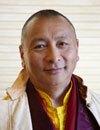
By this twenty-first century, regardless of what part of this planet we live in, whether we live in the East or the West, we have opportunity to encounter the Buddha’s teachings. In fact, at this point in history, these teachings are gradually becoming less prominent in the East and more prominent in the West. The evidence of this is the continued visits of and presence of so many great masters in this country. This is not an accident or coincidence. According to the Sixteenth Gyalwang Karmapa, this is a result of the ripening of the aspirations of buddhas and bodhisattvas and the accumulation of merit by beings in these countries to which the buddhadharma is now spreading. We see that the dharma has been threatened in some Asian countries like Tibet. And, in some others such as Japan and China, people appear to be losing interest in it. We, on the other hand, have a growing opportunity to encounter these teachings, and especially through the vision of the Sixteenth Gyalwang Karmapa, there are so many dharma centers like this one [Palchen Study Group Evansville] present in this country.
I don’t consider myself particularly learned, but I do feel that I have the responsibility, the duty, and the honor, to continue to serve the vision of my guru, the Sixteenth Gyalwang Karmapa. About this we have a saying: “It is better to serve your guru for one day than to spend your whole life in intensive practice.” Now this sounds odd, even contradictory. But remember that according to the vajrayana, as is said, “The guru is the buddha; the guru is the dharma; the guru does everything.”
The guru is our permanent and true source of refuge, and his only concern, his only wish or aim, is to help beings. Even though we ourselves in attempting to facilitate or assist the enactment of our guru’s vision may feel that we lack great ability, the guru that we serve is the embodiment of the activity of all buddhas of past, present, and future. Therefore, when we engage in service of our guru, we are in fact pouring the paltry, little drop of water of our own ability into the vast, inexhaustible ocean of his ability, which means that until his aspirations for beings have been achieved, this ocean of activity will never dry up; it will continue. We take part in something that is tremendous and we gain a source of inexhaustible merit, a source of endless benefit for ourselves and others. For example, here at this Palchen Study Group you all practice together in harmony, helping one another, sharing what knowledge you have with one another, and so on. By doing this you are serving the Buddha’s teachings.
We say the buddhadharma is twofold — tradition and realization. All the Buddhist organizations that exist throughout the world exist for no other purpose than to serve these two aspects of dharma — tradition and realization. Whenever we facilitate someone else’s access to the teachings, access to practice, whenever we share what we know with them, whenever we make it easier for them to understand or access the dharma, whenever we teach, compose writings, or debate, or discuss the dharma, we are serving the dharma of tradition. Whenever we practice, whenever we study, whenever we meditate, we are serving the dharma of realization. Our purpose in practicing is that we are trying to emulate and reproduce the realization of our guru in our own minds.
If you continue in this way, as you are now, you will be doing the best thing possible to eventually bring all beings to a state of liberation. And in the short term, you will certainly assure that you will be able to continue to take human rebirths without obstacle or impediment.
So whether you are practicing or assisting others, do so with all of this in mind, and especially with an attitude of empathy and benevolence, with a motivation of bodhichitta, with the aspiration, “May this help them.” This will ensure that everything you do — your involvement, your study, your practice, and your service — lead to the best results for yourself and others.
[From a teaching on The Song of the Young Bee given by Bardor Tulku Rinpoche in Evansville, Indiana in 2012. Translated by Lama Yeshe Gyamtso. The complete teaching is available for purchase as an MP3 download from the KPL Bookstore.]
